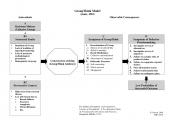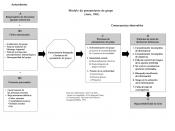In the field of group dynamics, Janis (1972) has recognised that a particular combination of group characteristics can cause disastrous decisions: he labels these characteristics and their outcomeas 'groupthink', defined as 'a deterioration of mental efficiency and moral judgement that results from in-group pressures' (Janis, 1972). From his archival studies of some recent American government decisional 'fiascos', Janis found a set of conditions which created an atmosphere causing poor decision-making; although there has been very little research since Janis proposed his theory, both theoretical and practical issues arise from it.
One disastrous decision that Janis studies was the invasion of Cuba's Bay of Pigs in 1961, which he describes as 'the perfect failure'. The advisory group contained the brightest and most able people in the USA, yet all their fundamental assumptions were incorrect; for example, they assumed that the Cuban airforce was weak and ineffective despite losing half of their American bombers to them.
Similar examples can be found in Europe: the decision by Britain's National Coal Board to ignore warning about a possible coal tip slide in Aberfan, Wales, in order to save time and money, resulted in the 1966 tragedy of burying the local school and decimating an entire community. Decision such as this, argues Janis, can be explained by groupthink.
It is important to recognise the antecedent conditions of groupthink. The most important is a high level of group cohesiveness: the mebers are attracted to each other and to the group goal, and display concurrence-seeking tendencies, or the desire to maintain the atmosphere of the group by agreeing with the common view. The more insulated from outside influences the group is, the more likely it is to suffer from groupthink, because there is little opportunity for members to hear and discuss the...



Much better effort.
You seem to have submitted half a dozen essays in the span of an half hour mostly consisting of nothing more than stock definitions with titles beginning with "What is___". Good to see you at least took this topic seriously.
0 out of 4 people found this comment useful.